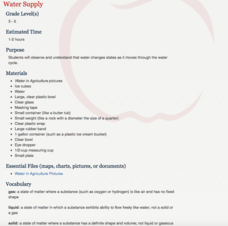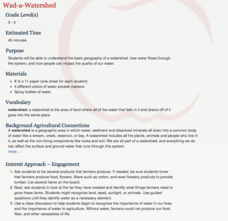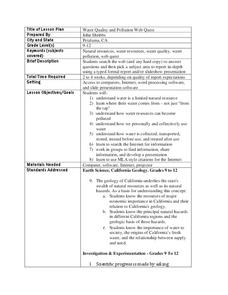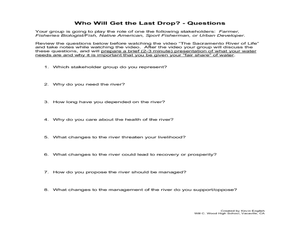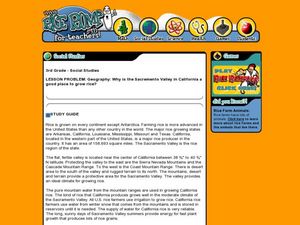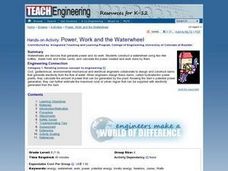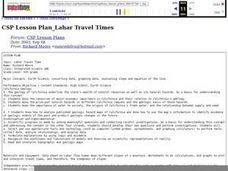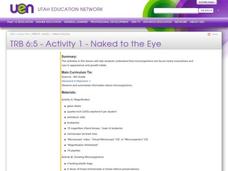National Institute of Food and Agriculture
Water Supply
Participate in three activities that look at the earth's limited water supply and the changes water goes through as it enters each phase of the water cycle. The resource is complete with three activities that demonstrate the changing...
San Francisco Public Utilities Commission
Our Water: Many Users - Many Uses
California's water supply is not always stable. Learn about the ways that California weathers a drought with a reading activity about water usage and agriculture. Once kids finish the reading passage, they answer a series of...
San Francisco Public Utilities Commission
What is Groundwater? Our Underground Water Supply
Learn about the consequences of groundwater with a lesson about the different ways California handles water conservation and pollution. After reading a passage about the water table, learners apply what they have read to six...
San Francisco Public Utilities Commission
What is Drought? No Rain, No Water
How can climate change affect our water supply? Have kids read a passage about the water cycle and water conservation, which includes six questions that challenge them to use context clues.
San Francisco Public Utilities Commission
Water from the Well
How much water does it take to brush your teeth? How about to wash your clothes? Perform an experiment that measures water usage in everyday tasks and compares them to the days before indoor plumbing, specifically the California...
San Francisco Public Utilities Commission
Recycled Water: A Smart Way to Reuse Water
Learn about wastewater and recycled water with a science reading activity. After learners finish a two-page passage about conserving the water supply, they answer six comprehension questions about what they have read.
Agriculture in the Classroom
Wad-a-Watershed
What kind of impact do humans have on watersheds? Find out in a lesson that defines, explores, and promotes ways to protect our watersheds. The ultimate goal of the lesson is for learners to discover how a watershed is impacted by...
San Francisco Public Utilities Commission
Hetch Hetchy: The Story of San Francisco's Water
How did San Francisco supply enough water for its residents over the last two centuries? Learn about droughts and water conservation in California, as well as specific historical events that led to the water system today. Kids read...
US Environmental Protection Agency
Sea Level: On the Rise
With the global temperature on the rise, the effects of climate change are starting to be seen. However, many people have a difficult time conceptualizing the long-term effects, such as sea levels rising. Given an easy and effective...
Curated OER
Water Quality and Pollution Web Quest
Learners explore how water is a limited resource, where it comes from, how it can become polluted and how it is used. In this water quality instructional activity high schoolers search the web to answer given questions and prepare...
Curated OER
California- Gold Fever
In this Gold Rush instructional activity, students read a one page article with pictures and maps pertaining to the Gold Rush in California in 1949. Students then answer 4 essay questions.
Curated OER
Water World
Students explore the various steps of the water cycle. They identify the three steps in the water cycle and how they are related. Students describe three ways to conserve water. Students explore the origin of the water source that...
Curated OER
Water: to the Last Drop
Middle schoolers research how water played an important role in US history. In this social studies lesson plan, students make a mock newscast from one of the events they researched. They present their newscast to the class.
Curated OER
Who Will Get the Last Drop?
Students discuss the importance of California's water system. In this earth science lesson plan, student play the role of different stakeholders. They present a 2-3 minute argument on their group's perspective about their need for water.
Curated OER
Watersheds: The San Francisco Bay Watershed
Sixth graders make a model of a watershed. In this geography instructional activity, 6th graders view a shaded relief map of California and locate landmarks. Students examine the San Francisco Bay Watershed by following the journey...
Curated OER
How is Gold Found in the Ground?
Fourth graders participate in a series of activities designed to simulate mining for gold. They pan for "gold" and create a safe tunnel.
Curated OER
Houghton Mifflin Social Studies/Chapter 13, Lesson 1 The Past Shapes the Future (pp. 292-295)
Fourth graders reflect upon the events of the past in order to make cognitive connections to present or future history. Students use Blooms Taxonomy to attain higher levels of thinking.
Curated OER
Geography: Why Is the Sacremento Valley a Good Place to Grow Rice?
Third graders locate the Sacramento Valley in California where rice is grown. In this rice growing location lesson, 3rd graders locate the Sacremento Valley, California on a map, and color the mountain ranges and terrain that is around...
Curated OER
Power, Work and the Waterwheel
Students use a two-liter bottle, dowel rod and index cards to design and construct a water wheel. They then calculate the power created and measure the work done by the water wheel in Watts and Joules.
Curated OER
Drought Threatens Huge Man-Made Lake
Students locate Lake Mead, then read a news article about Lake Mead drying up and how that would effect water and power supplies to the region. In this current events lesson, the teacher introduces the article with a map and vocabulary...
Curated OER
Lahar Travel Time
Ninth graders analyze published geologic hazard maps of California and comprehend how to use the map's information to identify evidence of geologic events of the past and present and predict geologic changes in the future. They select...
Curated OER
Naked to the Eye
Sixth graders conduct a variety of experiments that enable them to investigate bacteria. They use microscopes, prepared slides, video, moldy bread and pond water to observe types of bacteria and how bacteria interacts with the...
Curated OER
Mapping the Sea Floor
Students review their prior knowledge on topographical maps. Using a map, they examine the sea floor off the coast of San Diego, California. With a partner, they chart the sea floor of an area and use cutouts to create a visual...
Illustrative Mathematics
Mile High
What is the meaning of sea level? This resource helps your class understand the meaning of elevations above, below, and at sea level. Provides for good discussion on using positive and negative numbers to represent quantities in the real...
